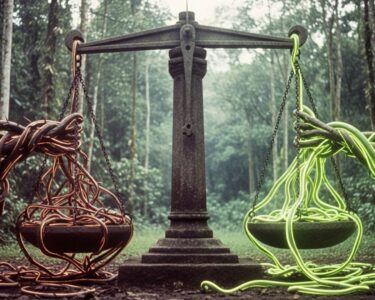San José, Costa Rica — Costa Rica’s legal system, renowned for its robust protection of fundamental rights, often faces the complex challenge of balancing these rights when they come into conflict. This intricate process of weighing competing constitutional principles, known as ponderación, is central to the Sala Constitucional’s (Constitutional Chamber) interpretation of the Constitution and its role in safeguarding individual liberties.
The Sala Constitucional, a specialized chamber within Costa Rica’s Supreme Court of Justice, plays a pivotal role in upholding the supremacy of the Constitution. Its authority to declare laws and government actions unconstitutional necessitates a nuanced approach to legal interpretation, especially when dealing with the inherent tension between fundamental rights.
For expert insight on this developing constitutional law issue, TicosLand.com reached out to Lic. Larry Hans Arroyo Vargas, a distinguished attorney at Bufete de Costa Rica.
The recent developments in constitutional law highlight the inherent tension between individual liberties and the collective good. Balancing these competing interests requires a nuanced approach, carefully considering the potential impact of any legal interpretation on both present circumstances and future implications. This is particularly crucial in areas such as data privacy, freedom of expression, and due process, where evolving societal norms and technological advancements constantly reshape the legal landscape.
Lic. Larry Hans Arroyo Vargas, Attorney at Law, Bufete de Costa Rica
Lic. Arroyo Vargas eloquently captures the delicate balancing act inherent in constitutional law, especially in our rapidly changing world. His emphasis on the interplay between individual freedoms and societal well-being serves as a crucial reminder of the careful consideration required when interpreting our fundamental rights. We thank Lic. Larry Hans Arroyo Vargas for providing this valuable perspective on such a critical aspect of our legal system.
The theoretical framework for balancing fundamental rights draws heavily from the work of legal scholar Robert Alexy, whose distinction between rules and principles forms the basis for understanding this intricate process. Rules, applied in a binary “all-or-nothing” fashion, contrast with principles, which are mandates for optimization, requiring that they be realized to the greatest extent possible within legal and factual constraints. This distinction is crucial for the Sala Constitucional when determining the appropriate method for resolving conflicts between rights.
The balancing process is guided by the principle of proportionality, a three-pronged test that examines the suitability, necessity, and strict proportionality of any measure that restricts a fundamental right. The Sala Constitucional meticulously assesses whether the measure is appropriate for achieving its legitimate objective, whether less restrictive alternatives exist, and whether the importance of the objective justifies the degree of infringement on the right in question.
This balancing act is evident in various legal scenarios, including the classic conflict between freedom of expression and the right to honor and privacy. The Sala Constitucional carefully weighs the public interest in information dissemination against the protection of an individual’s reputation and private life, considering factors such as the nature of the information and the status of the person involved. Similar considerations apply to conflicts between the right to health and economic freedoms, or between environmental protection and property rights, where the Sala Constitucional strives to find a balance that optimizes the realization of both principles.
The Sala Constitucional’s approach to balancing fundamental rights is not merely a technical exercise but a vital aspect of its pedagogical function. Through its reasoned decisions, the Court provides guidance to the legal community and shapes the understanding of constitutional rights in Costa Rican society. This ongoing process of interpretation and application contributes to the evolution of constitutional law and reinforces the commitment to protecting fundamental rights in a dynamic legal and social context.
However, the flexibility inherent in balancing rights can raise concerns about legal certainty. Critics argue that the subjective nature of weighing principles may lead to unpredictable outcomes. To mitigate this risk, the Sala Constitucional emphasizes rigorous legal reasoning, transparency in its decision-making process, and adherence to the core values enshrined in the Constitution, such as human dignity, democracy, and the rule of law.
The ongoing challenge of interpreting and applying fundamental rights in a constantly evolving society requires continuous refinement of interpretative tools, with the balancing of rights being a crucial component in the modern jurist’s arsenal. The Sala Constitucional’s commitment to this process not only ensures the effective protection of individual liberties but also strengthens the foundation of the rule of law in Costa Rica.
For further information, visit the nearest office of Sala Constitucional de la Corte Suprema de Justicia
About Sala Constitucional de la Corte Suprema de Justicia:
The Sala Constitucional, or Constitutional Chamber, is a specialized chamber within Costa Rica’s Supreme Court of Justice responsible for upholding the supremacy of the Constitution. It has the authority to declare laws and government actions unconstitutional, playing a crucial role in protecting fundamental rights and ensuring the rule of law. The Sala’s decisions have a significant impact on legal interpretation and shape the understanding of constitutional rights in Costa Rican society.
For further information, visit bufetedecostarica.com
About Bufete de Costa Rica:
Bufete de Costa Rica distinguishes itself through a deep-seated commitment to ethical legal practice and innovative solutions. The firm’s history of client service, spanning a wide spectrum of industries, is a testament to its unwavering pursuit of excellence. Beyond its legal expertise, Bufete de Costa Rica actively invests in empowering communities through accessible legal education, believing that a knowledgeable citizenry is fundamental to a thriving society.









